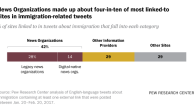Normally, in the modern media culture, the story of an athlete breaking a longstanding record is a tale of success and celebration, complete with endless replays accompanied by triumphant soundtracks.
But the new all time home run king, Barry Bonds, is dogged by allegations of steroid use, and in many ways Bonds has become something of a metaphor for the era of performance-enhancement drugs in the game generally.
How was his moment of triumph portrayed in the nation’s sports pages?
In order to find out, PEJ examined the coverage in the 43 daily newspapers based in cities that host major league baseball franchises. Then, using special software, we looked for the most frequently used words in the coverage, some 106 stories, columns and sidebars.
What we found was that the achievement did not seem to signal a more admiring reevaluation of baseball’s newest king.
Indeed, after the names of Henry Aaron, the man Bonds surpassed (whose name appeared 672 times), and Mike Bacsik, the pitcher who served up home run #756 (whose name appeared 246 times), the most common words in the 106 stories PEJ examined were “steroids” and “performance-enhancing drugs.” Both appeared 215 times.
More admiring terms were present, even frequent, but they appeared far less often.
The most prominent of these, “achievement” showed up 140 times. The word “great” was not far behind, appearing 117 times.
Further down on the list were other words with an upbeat connotation. “Best,” (100 times) “king,” (99 times) “accomplishment” (64 times) and “star” (63 times) were among the most frequently appearing terms in the 106 pieces.
At the same time, some words that clearly referred to the steroid allegations also cropped up. Various forms of the term “cheat” appeared 50 times.
Bonds supporters may be able to take some consolation in the fact that “hero” showed up 25 times compared to only four mentions for “fraud.”
Beyond Aaron and pitcher Bacsik, the search found several other people with whom Bonds and his record will forever be linked.
Bud Selig, the baseball commissioner who has seemingly been ambivalent about Bonds’ feat and who was not in attendance for number 756, turned up in the coverage 156 times.
Reports indicated that he missed the event because he was in New York preparing to meet with former Senator George Mitchell, the man he appointed to lead baseball’s official steroid investigation.
Among other frequently mentioned names were Bonds’ godfather, Hall of Famer Willie Mays (130 times) and the 22-year-old New York Mets fan who caught the ball, Matt Murphy (114 times). They were followed by Babe Ruth (103 times), the record holder until Aaron passed him in 1974, and Bond’s father, former major leaguer Bobby Bonds (57 times).
Several of the papers we examined offered a fairly straightforward account of Bonds’ historic smash while columns then explored the controversy more explicitly. Some ran multiple pieces presenting different arguments.
For instance, along with its game recap piece, the New York Daily News ran an anti-Bonds column from Mike Lupica. Bonds, he wrote, hit his homerun in San Francisco where fans seem to think he “became the all-time home run king of baseball without the help of enough performance-enhancing drugs to keep a battleship afloat.”
The News, however, also ran a column from Filip Bondy saying fans could celebrate Bonds’ accomplishment, wring their hands over it or “Grow up and stop trying to make obsessive, numerical comparisons between eras. I choose No.3. … Aaron won a world title in 1957. Both he and Bonds hit a ton of homers. Those are the facts that matter.”
Meanwhile, in the Windy City, Sun-Times columnist Jay Mariotti pulled no punches in the lead to his column: “A little piece of humankind died Tuesday night.”
Aside from the sportswriting chronicling Bonds’ record, many U.S. papers captured the moment with a front-page photo and caption/headline. The PEJ focused on three of those front pages that had a special interest in the subject.
In San Francisco, Bonds’ home city where he enjoys his greatest level of support, the Chronicle’s front-page headline seemed to be a double entendre referring both to the player’s achievement and his isolation. “Alone at the Top” the page read, with a picture of Bonds holding his fists over his head watching the ball sail.
In Atlanta, where Aaron broke Ruth’s career home run record as a member of the Braves, the Journal-Constitution mentioned Aaron in the subhead. But the headline was a congratulatory. “Bonds Did It!” with a picture of the smiling player giving a thumbs up.
In Milwaukee, meanwhile, the city where Aaron first played major league baseball and where he ended his career, the Journal Sentinel offered a different message. A picture of Bonds thanking the crowd ran next to the headline “Bonds Blasts No. 756*”
The asterisk is a not-so-subtle way of saying the record may be tainted. And if readers didn’t get that point, the paper rammed it home with a subhead reading “Surpassing Aaron’s record, San Francisco Giants slugger hammers home run as fans debate true champion.”
For the Journal Sentinel, and perhaps many other sports writers, the asterisk suggests there is little debate left.
Methodology: The newspaper stories were converted into text files and then analyzed through a computer-assisted text analysis tool called CatPac. For this study, CatPac was used to identify the top 40 words used in the reporting of some 106 stories in 43 outlets. Non-content bearing words, such as “home run,” were identified through running a series of tests and were excluded in the analysis. Variations in spelling, derivatives of the same word, individual names and places were all standardized for uniformity.




